Analysis of Legal and Ethical Issues in Nursing Practice
VerifiedAdded on 2021/02/20
|7
|1453
|123
Report
AI Summary
This report examines legal and ethical issues in nursing practice, focusing on the case of Ms. Christine Jones. It identifies the Guardianship and Administration Act 1990 and the Fair Work Act 2009 as relevant legislation. The report analyzes the application of the Guardianship and Administration Act to Ms. Jones's situation, emphasizing the importance of consent and exemptions in emergency scenarios. An ethical dilemma faced by a registered nurse is explored, specifically the conflict between patient confidentiality and the mother's request regarding the patient's pregnancy. Strategies for resolving this ethical challenge, such as avoiding, accommodating, and collaborating, are discussed. The report concludes with a reference list of relevant sources. This assignment provides valuable insights into the ethical and legal responsibilities of nurses, offering practical approaches to navigate complex situations and uphold patient rights.
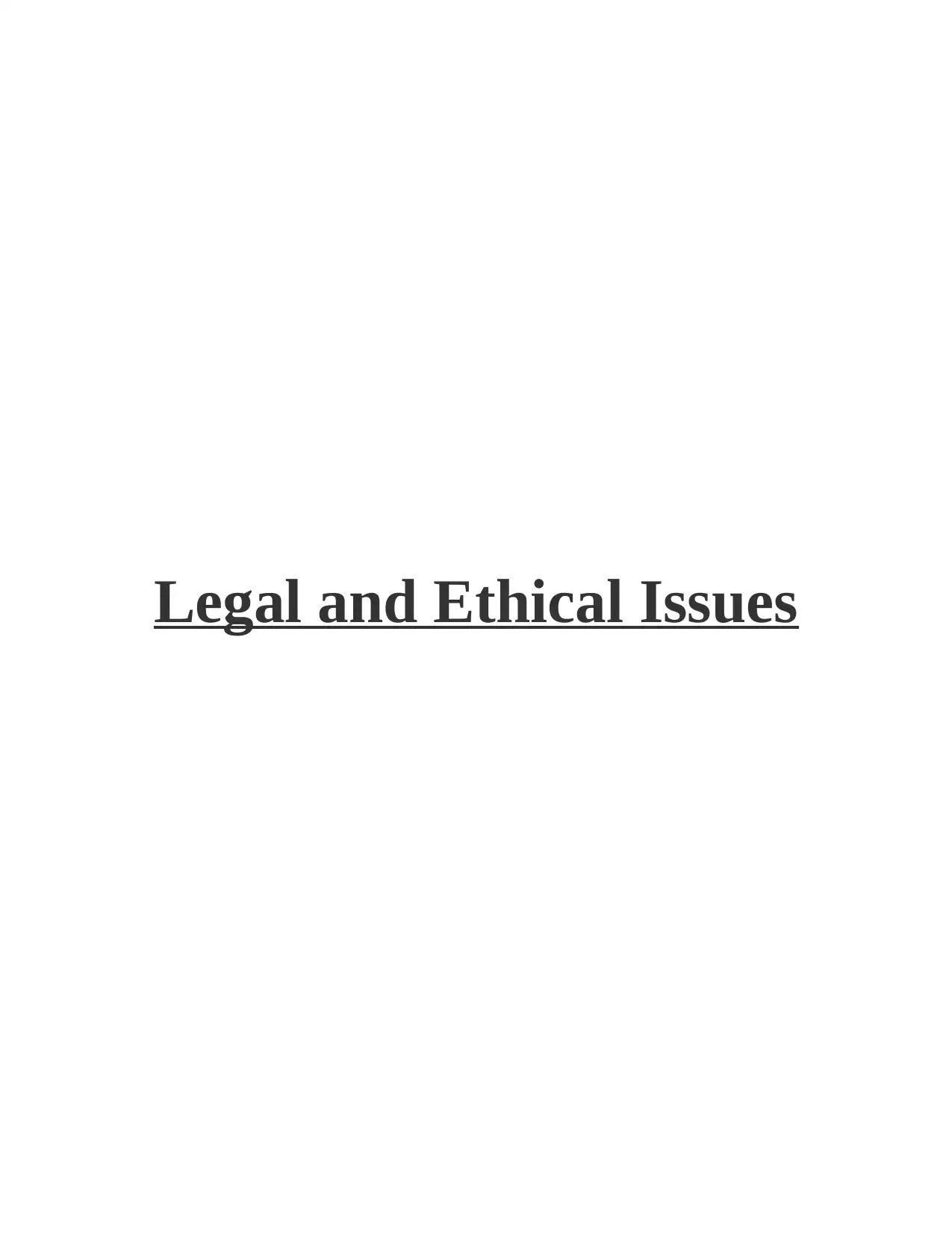
Legal and Ethical Issues
Paraphrase This Document
Need a fresh take? Get an instant paraphrase of this document with our AI Paraphraser
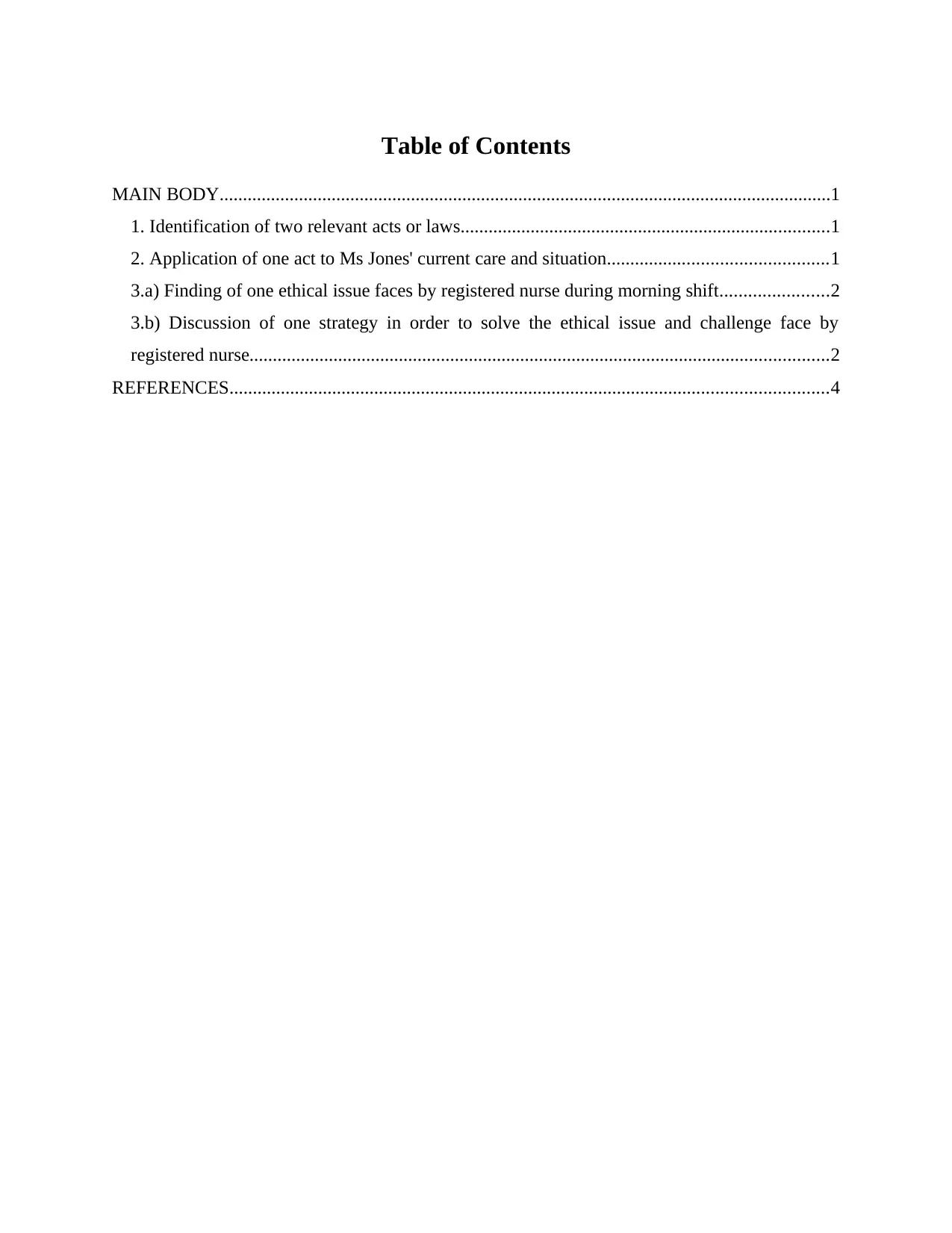
Table of Contents
MAIN BODY...................................................................................................................................1
1. Identification of two relevant acts or laws...............................................................................1
2. Application of one act to Ms Jones' current care and situation...............................................1
3.a) Finding of one ethical issue faces by registered nurse during morning shift.......................2
3.b) Discussion of one strategy in order to solve the ethical issue and challenge face by
registered nurse............................................................................................................................2
REFERENCES................................................................................................................................4
MAIN BODY...................................................................................................................................1
1. Identification of two relevant acts or laws...............................................................................1
2. Application of one act to Ms Jones' current care and situation...............................................1
3.a) Finding of one ethical issue faces by registered nurse during morning shift.......................2
3.b) Discussion of one strategy in order to solve the ethical issue and challenge face by
registered nurse............................................................................................................................2
REFERENCES................................................................................................................................4
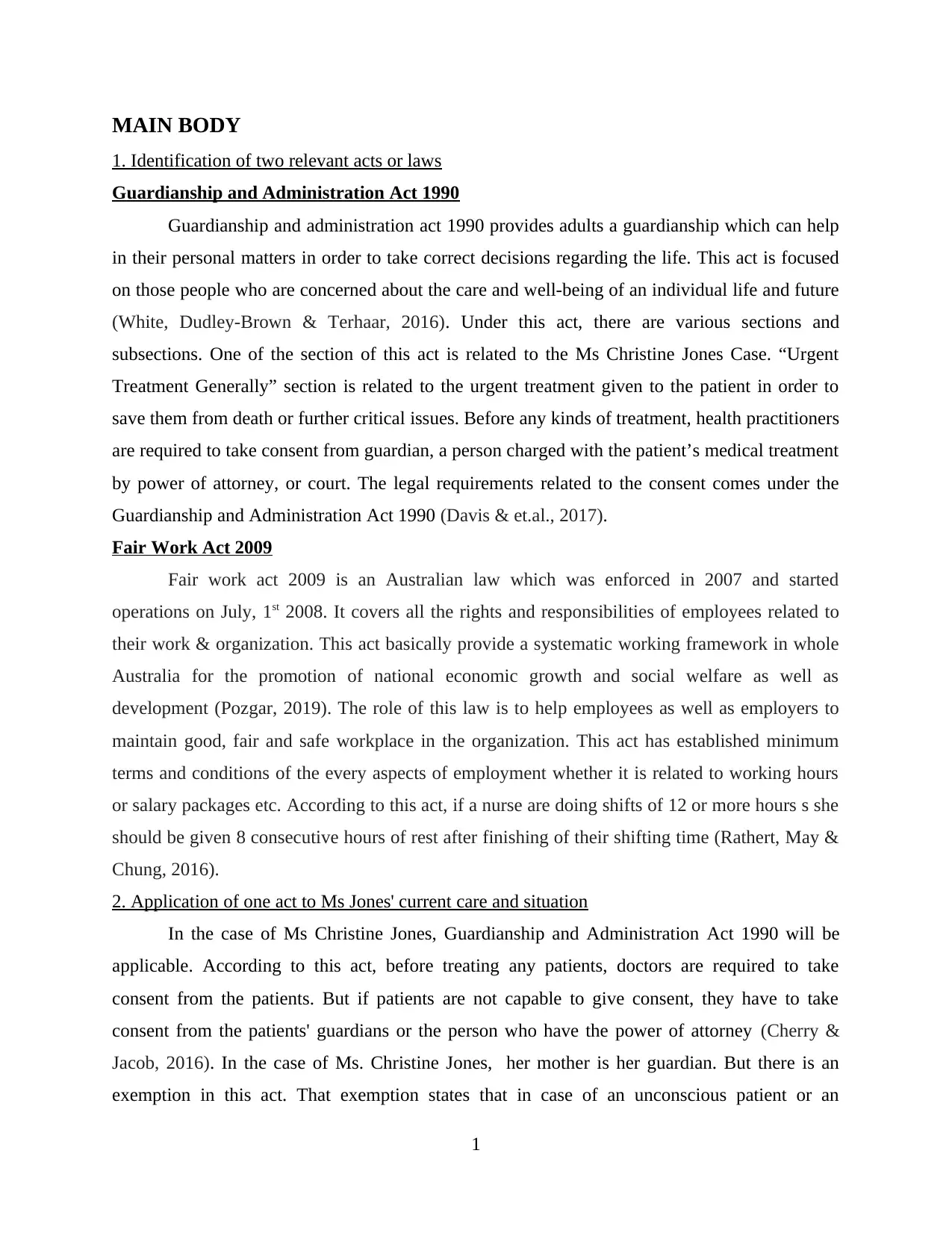
MAIN BODY
1. Identification of two relevant acts or laws
Guardianship and Administration Act 1990
Guardianship and administration act 1990 provides adults a guardianship which can help
in their personal matters in order to take correct decisions regarding the life. This act is focused
on those people who are concerned about the care and well-being of an individual life and future
(White, Dudley-Brown & Terhaar, 2016). Under this act, there are various sections and
subsections. One of the section of this act is related to the Ms Christine Jones Case. “Urgent
Treatment Generally” section is related to the urgent treatment given to the patient in order to
save them from death or further critical issues. Before any kinds of treatment, health practitioners
are required to take consent from guardian, a person charged with the patient’s medical treatment
by power of attorney, or court. The legal requirements related to the consent comes under the
Guardianship and Administration Act 1990 (Davis & et.al., 2017).
Fair Work Act 2009
Fair work act 2009 is an Australian law which was enforced in 2007 and started
operations on July, 1st 2008. It covers all the rights and responsibilities of employees related to
their work & organization. This act basically provide a systematic working framework in whole
Australia for the promotion of national economic growth and social welfare as well as
development (Pozgar, 2019). The role of this law is to help employees as well as employers to
maintain good, fair and safe workplace in the organization. This act has established minimum
terms and conditions of the every aspects of employment whether it is related to working hours
or salary packages etc. According to this act, if a nurse are doing shifts of 12 or more hours s she
should be given 8 consecutive hours of rest after finishing of their shifting time (Rathert, May &
Chung, 2016).
2. Application of one act to Ms Jones' current care and situation
In the case of Ms Christine Jones, Guardianship and Administration Act 1990 will be
applicable. According to this act, before treating any patients, doctors are required to take
consent from the patients. But if patients are not capable to give consent, they have to take
consent from the patients' guardians or the person who have the power of attorney (Cherry &
Jacob, 2016). In the case of Ms. Christine Jones, her mother is her guardian. But there is an
exemption in this act. That exemption states that in case of an unconscious patient or an
1
1. Identification of two relevant acts or laws
Guardianship and Administration Act 1990
Guardianship and administration act 1990 provides adults a guardianship which can help
in their personal matters in order to take correct decisions regarding the life. This act is focused
on those people who are concerned about the care and well-being of an individual life and future
(White, Dudley-Brown & Terhaar, 2016). Under this act, there are various sections and
subsections. One of the section of this act is related to the Ms Christine Jones Case. “Urgent
Treatment Generally” section is related to the urgent treatment given to the patient in order to
save them from death or further critical issues. Before any kinds of treatment, health practitioners
are required to take consent from guardian, a person charged with the patient’s medical treatment
by power of attorney, or court. The legal requirements related to the consent comes under the
Guardianship and Administration Act 1990 (Davis & et.al., 2017).
Fair Work Act 2009
Fair work act 2009 is an Australian law which was enforced in 2007 and started
operations on July, 1st 2008. It covers all the rights and responsibilities of employees related to
their work & organization. This act basically provide a systematic working framework in whole
Australia for the promotion of national economic growth and social welfare as well as
development (Pozgar, 2019). The role of this law is to help employees as well as employers to
maintain good, fair and safe workplace in the organization. This act has established minimum
terms and conditions of the every aspects of employment whether it is related to working hours
or salary packages etc. According to this act, if a nurse are doing shifts of 12 or more hours s she
should be given 8 consecutive hours of rest after finishing of their shifting time (Rathert, May &
Chung, 2016).
2. Application of one act to Ms Jones' current care and situation
In the case of Ms Christine Jones, Guardianship and Administration Act 1990 will be
applicable. According to this act, before treating any patients, doctors are required to take
consent from the patients. But if patients are not capable to give consent, they have to take
consent from the patients' guardians or the person who have the power of attorney (Cherry &
Jacob, 2016). In the case of Ms. Christine Jones, her mother is her guardian. But there is an
exemption in this act. That exemption states that in case of an unconscious patient or an
1
⊘ This is a preview!⊘
Do you want full access?
Subscribe today to unlock all pages.

Trusted by 1+ million students worldwide
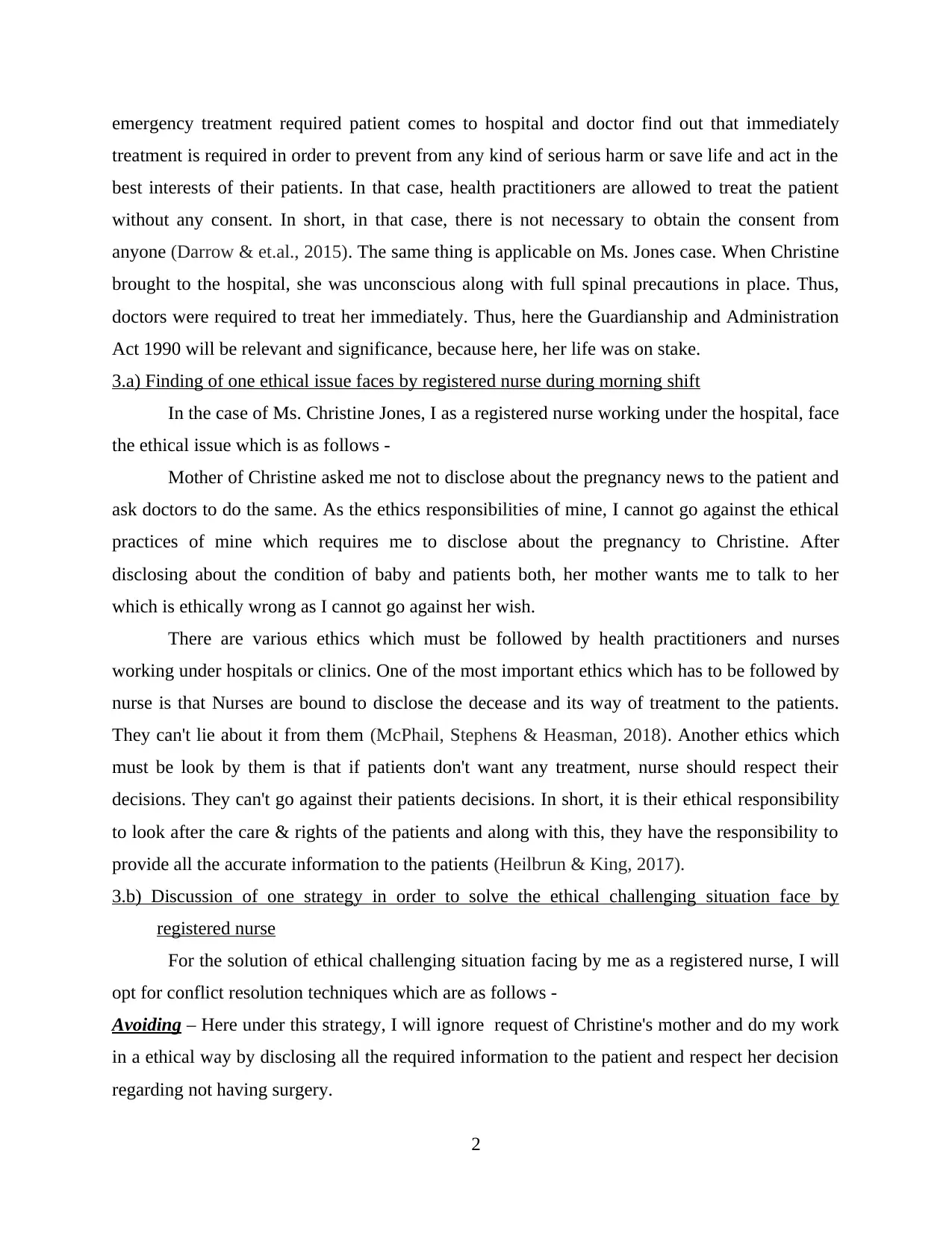
emergency treatment required patient comes to hospital and doctor find out that immediately
treatment is required in order to prevent from any kind of serious harm or save life and act in the
best interests of their patients. In that case, health practitioners are allowed to treat the patient
without any consent. In short, in that case, there is not necessary to obtain the consent from
anyone (Darrow & et.al., 2015). The same thing is applicable on Ms. Jones case. When Christine
brought to the hospital, she was unconscious along with full spinal precautions in place. Thus,
doctors were required to treat her immediately. Thus, here the Guardianship and Administration
Act 1990 will be relevant and significance, because here, her life was on stake.
3.a) Finding of one ethical issue faces by registered nurse during morning shift
In the case of Ms. Christine Jones, I as a registered nurse working under the hospital, face
the ethical issue which is as follows -
Mother of Christine asked me not to disclose about the pregnancy news to the patient and
ask doctors to do the same. As the ethics responsibilities of mine, I cannot go against the ethical
practices of mine which requires me to disclose about the pregnancy to Christine. After
disclosing about the condition of baby and patients both, her mother wants me to talk to her
which is ethically wrong as I cannot go against her wish.
There are various ethics which must be followed by health practitioners and nurses
working under hospitals or clinics. One of the most important ethics which has to be followed by
nurse is that Nurses are bound to disclose the decease and its way of treatment to the patients.
They can't lie about it from them (McPhail, Stephens & Heasman, 2018). Another ethics which
must be look by them is that if patients don't want any treatment, nurse should respect their
decisions. They can't go against their patients decisions. In short, it is their ethical responsibility
to look after the care & rights of the patients and along with this, they have the responsibility to
provide all the accurate information to the patients (Heilbrun & King, 2017).
3.b) Discussion of one strategy in order to solve the ethical challenging situation face by
registered nurse
For the solution of ethical challenging situation facing by me as a registered nurse, I will
opt for conflict resolution techniques which are as follows -
Avoiding – Here under this strategy, I will ignore request of Christine's mother and do my work
in a ethical way by disclosing all the required information to the patient and respect her decision
regarding not having surgery.
2
treatment is required in order to prevent from any kind of serious harm or save life and act in the
best interests of their patients. In that case, health practitioners are allowed to treat the patient
without any consent. In short, in that case, there is not necessary to obtain the consent from
anyone (Darrow & et.al., 2015). The same thing is applicable on Ms. Jones case. When Christine
brought to the hospital, she was unconscious along with full spinal precautions in place. Thus,
doctors were required to treat her immediately. Thus, here the Guardianship and Administration
Act 1990 will be relevant and significance, because here, her life was on stake.
3.a) Finding of one ethical issue faces by registered nurse during morning shift
In the case of Ms. Christine Jones, I as a registered nurse working under the hospital, face
the ethical issue which is as follows -
Mother of Christine asked me not to disclose about the pregnancy news to the patient and
ask doctors to do the same. As the ethics responsibilities of mine, I cannot go against the ethical
practices of mine which requires me to disclose about the pregnancy to Christine. After
disclosing about the condition of baby and patients both, her mother wants me to talk to her
which is ethically wrong as I cannot go against her wish.
There are various ethics which must be followed by health practitioners and nurses
working under hospitals or clinics. One of the most important ethics which has to be followed by
nurse is that Nurses are bound to disclose the decease and its way of treatment to the patients.
They can't lie about it from them (McPhail, Stephens & Heasman, 2018). Another ethics which
must be look by them is that if patients don't want any treatment, nurse should respect their
decisions. They can't go against their patients decisions. In short, it is their ethical responsibility
to look after the care & rights of the patients and along with this, they have the responsibility to
provide all the accurate information to the patients (Heilbrun & King, 2017).
3.b) Discussion of one strategy in order to solve the ethical challenging situation face by
registered nurse
For the solution of ethical challenging situation facing by me as a registered nurse, I will
opt for conflict resolution techniques which are as follows -
Avoiding – Here under this strategy, I will ignore request of Christine's mother and do my work
in a ethical way by disclosing all the required information to the patient and respect her decision
regarding not having surgery.
2
Paraphrase This Document
Need a fresh take? Get an instant paraphrase of this document with our AI Paraphraser
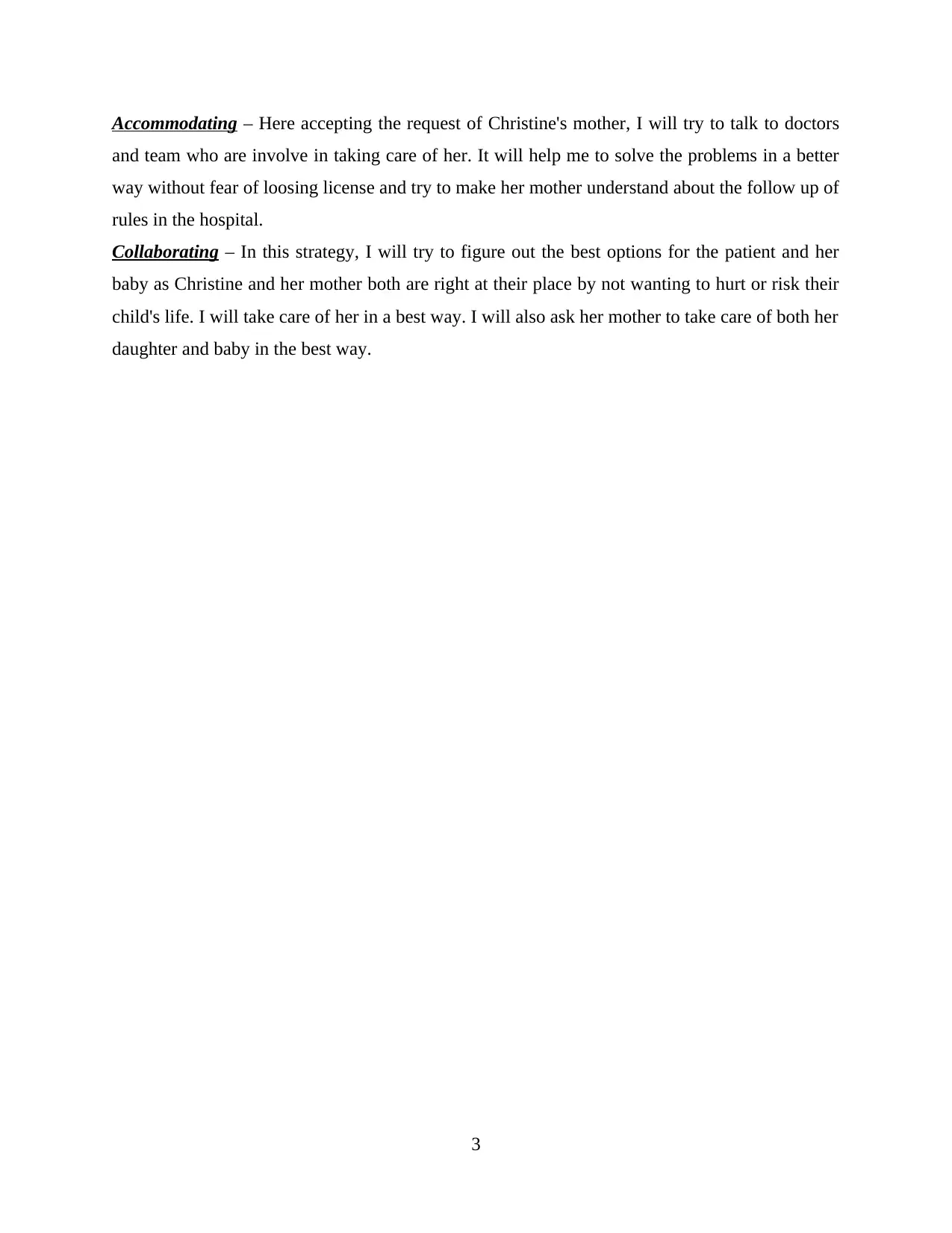
Accommodating – Here accepting the request of Christine's mother, I will try to talk to doctors
and team who are involve in taking care of her. It will help me to solve the problems in a better
way without fear of loosing license and try to make her mother understand about the follow up of
rules in the hospital.
Collaborating – In this strategy, I will try to figure out the best options for the patient and her
baby as Christine and her mother both are right at their place by not wanting to hurt or risk their
child's life. I will take care of her in a best way. I will also ask her mother to take care of both her
daughter and baby in the best way.
3
and team who are involve in taking care of her. It will help me to solve the problems in a better
way without fear of loosing license and try to make her mother understand about the follow up of
rules in the hospital.
Collaborating – In this strategy, I will try to figure out the best options for the patient and her
baby as Christine and her mother both are right at their place by not wanting to hurt or risk their
child's life. I will take care of her in a best way. I will also ask her mother to take care of both her
daughter and baby in the best way.
3

4
⊘ This is a preview!⊘
Do you want full access?
Subscribe today to unlock all pages.

Trusted by 1+ million students worldwide
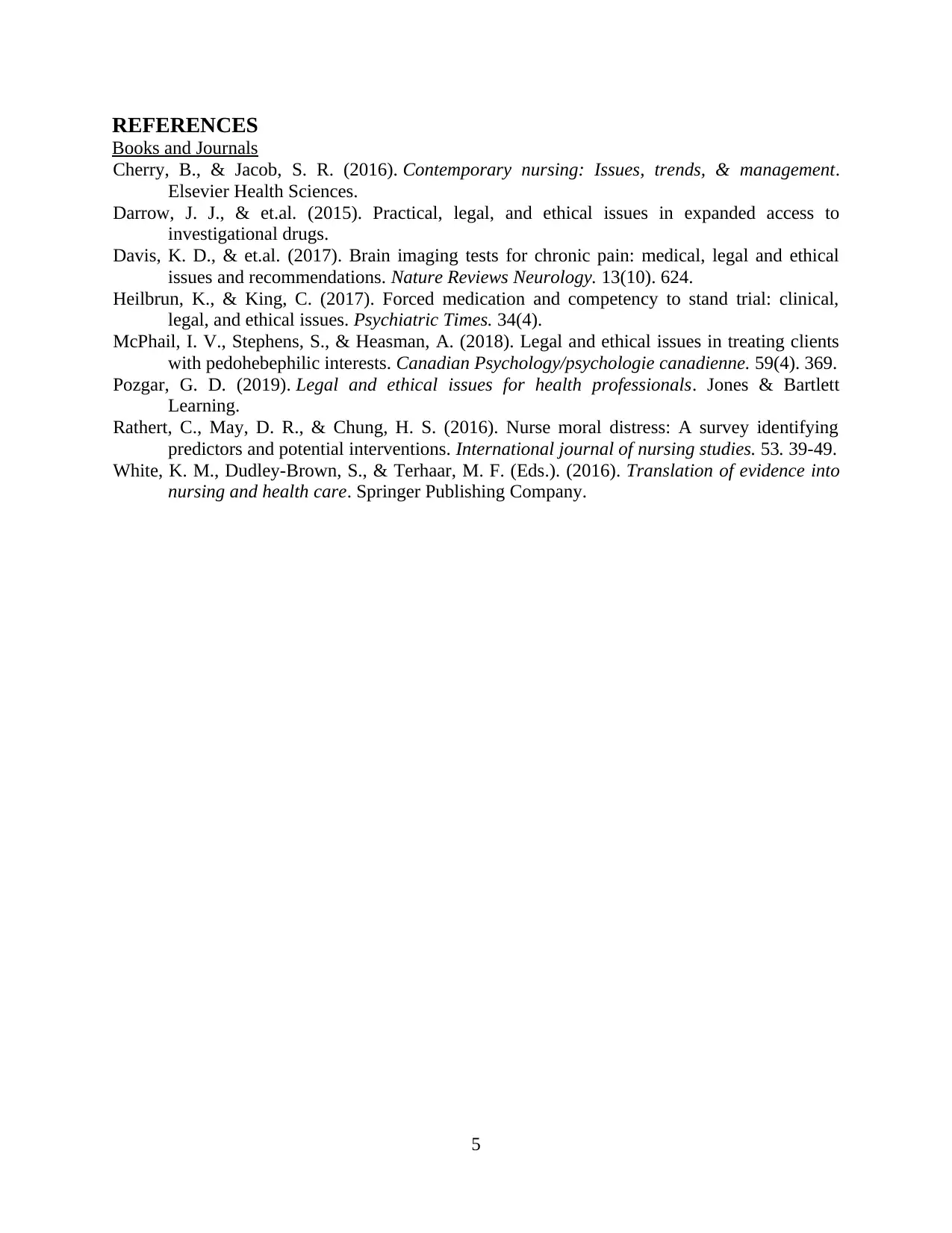
REFERENCES
Books and Journals
Cherry, B., & Jacob, S. R. (2016). Contemporary nursing: Issues, trends, & management.
Elsevier Health Sciences.
Darrow, J. J., & et.al. (2015). Practical, legal, and ethical issues in expanded access to
investigational drugs.
Davis, K. D., & et.al. (2017). Brain imaging tests for chronic pain: medical, legal and ethical
issues and recommendations. Nature Reviews Neurology. 13(10). 624.
Heilbrun, K., & King, C. (2017). Forced medication and competency to stand trial: clinical,
legal, and ethical issues. Psychiatric Times. 34(4).
McPhail, I. V., Stephens, S., & Heasman, A. (2018). Legal and ethical issues in treating clients
with pedohebephilic interests. Canadian Psychology/psychologie canadienne. 59(4). 369.
Pozgar, G. D. (2019). Legal and ethical issues for health professionals. Jones & Bartlett
Learning.
Rathert, C., May, D. R., & Chung, H. S. (2016). Nurse moral distress: A survey identifying
predictors and potential interventions. International journal of nursing studies. 53. 39-49.
White, K. M., Dudley-Brown, S., & Terhaar, M. F. (Eds.). (2016). Translation of evidence into
nursing and health care. Springer Publishing Company.
5
Books and Journals
Cherry, B., & Jacob, S. R. (2016). Contemporary nursing: Issues, trends, & management.
Elsevier Health Sciences.
Darrow, J. J., & et.al. (2015). Practical, legal, and ethical issues in expanded access to
investigational drugs.
Davis, K. D., & et.al. (2017). Brain imaging tests for chronic pain: medical, legal and ethical
issues and recommendations. Nature Reviews Neurology. 13(10). 624.
Heilbrun, K., & King, C. (2017). Forced medication and competency to stand trial: clinical,
legal, and ethical issues. Psychiatric Times. 34(4).
McPhail, I. V., Stephens, S., & Heasman, A. (2018). Legal and ethical issues in treating clients
with pedohebephilic interests. Canadian Psychology/psychologie canadienne. 59(4). 369.
Pozgar, G. D. (2019). Legal and ethical issues for health professionals. Jones & Bartlett
Learning.
Rathert, C., May, D. R., & Chung, H. S. (2016). Nurse moral distress: A survey identifying
predictors and potential interventions. International journal of nursing studies. 53. 39-49.
White, K. M., Dudley-Brown, S., & Terhaar, M. F. (Eds.). (2016). Translation of evidence into
nursing and health care. Springer Publishing Company.
5
1 out of 7
Related Documents
Your All-in-One AI-Powered Toolkit for Academic Success.
+13062052269
info@desklib.com
Available 24*7 on WhatsApp / Email
![[object Object]](/_next/static/media/star-bottom.7253800d.svg)
Unlock your academic potential
Copyright © 2020–2026 A2Z Services. All Rights Reserved. Developed and managed by ZUCOL.





